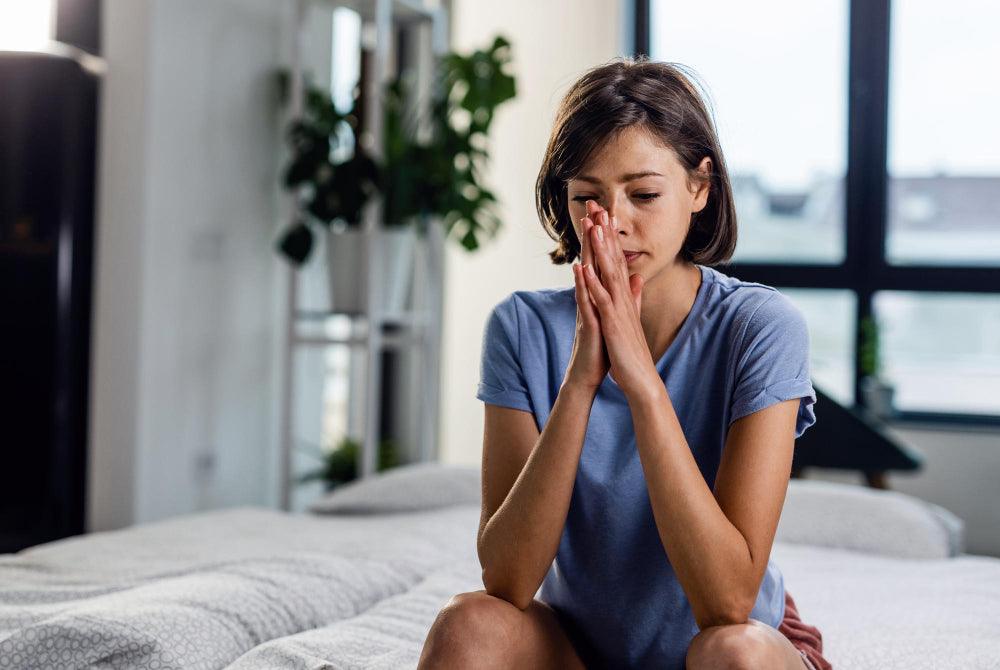
 Instagram
Instagram

Related products
An overview;

Ever wondered why you shook before an exam or why your palms started to sweat before a job interview? The body naturally uses these nervous emotions to get ready for a significant occasion.
Once the event began, you would have also noted how you began to relax; your breathing became smoother, and your heart stopped pounding. Such worry makes us more aware, which improves our performance.
But occasionally, for no apparent reason, people get anxious or have panic episodes. But if it becomes difficult for you to control your fears and such feelings persistently influence your daily routine activity, then it might be an anxiety disorder.
Types of anxiety disorder;
Many different disorders can result from anxiety. The most widespread types of anxiety disorders are:
- Generalised anxiety disorder (GAD);
People with generalised anxiety disorder have excessive anxiety and worry about a variety of things. They find it hard to control your anxious feelings and worries.
They become restless and disturbed. There is no specific trigger that contributes to generalised anxiety disorder.
- Obsessive-compulsive disorder;
Obsessive-compulsive disorder patients have anxiety-inducing, persistent thoughts and anxieties. They repeat certain actions to calm their nervousness.
For instance, a person who is afraid of germs and pollution may frequently wash their hands and the objects in their home.
- Social anxiety disorder;
People who suffer from social anxiety disorder are afraid of public speaking and other circumstances where they may be judged by others.
They are extremely afraid of being humiliated or embarrassed as a result of whatever they do or say. These individuals are unable to manage commonplace settings.
- Specific phobia;
People who have phobias go to tremendous measures to avoid the thing or circumstance that makes them anxious. Phobias are unfounded fears. This is also called social anxiety disorder.
Their anxieties may include something normal, such as spiders and tall buildings, as well as travelling in aeroplanes and being in crowded places. Specific phobia is not like other anxiety disorders.
- Post-traumatic stress disorder;
Post-traumatic stress disorder (PTSD) can develop after participating in or witnessing an extraordinarily stressful event like an accident or an assault. The person will struggle to relax or get any sleep because of frequent flashbacks to the incident.
Separation Anxiety disorder;
- Separation anxiety disorder is a childhood disorder related to separation from parents.
- Panic attacks
Uncontrollable panic attacks, which include a variety of physical symptoms such as dizziness, shortness of breath, and heavy sweating, are common symptoms of panic disorder.
They also describe psychological symptoms (thoughts) during these episodes, including a sense of impending doom and sentiments like "I'm going to die".
The person then lives in continual terror of experiencing another such incident because these attacks seem to occur for no apparent reason.
Causes of anxiety disorder;
The most common factors that trigger anxiety disorders include;
- Family history
Anxiety disorders are frequently present in those with a family history of mental illness. For example, obsessive-compulsive disorder is one condition that can run in families.
- Stress-full events
People who have experienced stress full events in their past may develop an anxiety disorder. These events include; the loss of a loved one, troubled relationship, and mental illness.
- Health problems;
Anxiety can also be brought on by conditions like heart disease, thyroid issues, asthma, or diabetes. Anxiety disorders' symptoms might manifest in depressed people as well.
For instance, a person with a lengthy history of depression may begin to perform poorly at work. As a result, there may be a rise in stress at work, which may cause anxiety. Welzo offers a cortisol blood test.
- Use of drugs;
Heavy drug abusers can also develop anxiety disorders, most frequently during withdrawal periods.
- Personality issues;
Certain personality types, such as ego maniacs or perfectionists, can probably experience anxiety-related problems. This may cause social anxiety disorder.
Anxiety symptoms;
Excessive fear or worry is the main symptom of anxiety disorders. Additionally, anxiety problems can make it difficult to breathe, sleep, remain motionless, and focus. The particular anxiety symptoms you experience depend on the sort of anxiety condition you have.
Following are the main Anxiety symptoms;
- Feelings of fear and worry
- Panic attacks
- Sleep problems and restlessness
- Light headache
- Nausea and vomiting
- Hair loss
- Deep breathing
- Gastrointestinal problems
- Increase heart rate
- Try to avoid people
How do you prevent anxiety?

Although it's impossible to know with certainty what will lead someone to develop an anxiety disorder, there are steps you can do if you already have one to reduce the severity of physical symptoms.
- Consult a doctor early;
Waiting to get treatment for anxiety, like many other mental health disorders, might make it more difficult.
- Keep yourself busy with some productive work;
Engage in things you find enjoyable and positive for your self-image. Enjoy the company of kind people and social interaction because they can help you relax.
- Avoid drugs;
Anxiety can be caused by or worsened by alcohol and drug usage. Quitting one of these substances can make you anxious if you are addicted to it. Visit your doctor or look for a support group if you are unable to stop on your own.
Treatment of generalised anxiety disorder;
Although anxiety problems can be treated, one should not minimise how serious the issue is. The best course of action is to get expert guidance and treatment if you experience any of the aforementioned symptoms. Treatment for anxiety disorders may include counselling, anxiety medication, or a combination of the two.
- Caring for the anxiety patient;
Your support can be very helpful in easing the distress of a friend or family member who is experiencing an anxiety disorder.
As with any ailment, the first step you should take is to educate yourself about the patient's issue so that you can understand their situation.
It takes a lot of patience to work with people who have anxiety disorders, but they occasionally need to be pushed and encouraged to face their anxieties or phobias to get over them. You must find the ideal balance for this; it is crucial.
- Learn skills to manage your anxiety;
You can acquire a variety of skills to control your anxiety. The most widely used approaches include relaxation, healthy living, stress management, and positive thinking.
It can be difficult to deal with anxiety on your own, particularly if you are feeling a lot of discomfort and unease. In such circumstances, it is always a good idea to seek professional guidance.
If you would like to learn more about mental health, see our information page here.































 Rated Excellent by 26,523+ Reviews
Rated Excellent by 26,523+ Reviews